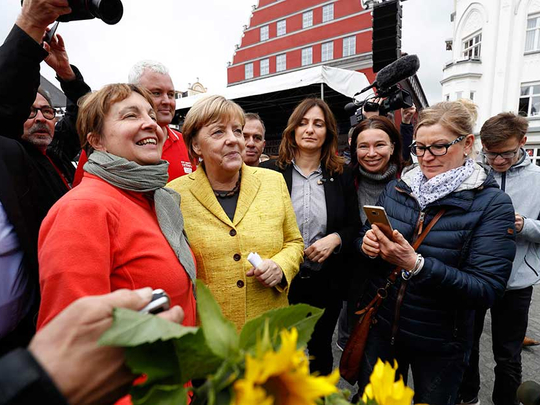
Novelists of the future will surely do a Hilary Mantel on Angela Merkel — try to recreate the secret gyroscopes of her mind, in her time. Here’s my advice to them: look west. For that, above all, is what Mutti — Mummy — as she is known to every German, whether they like or loathe her, believes in.
How could she not, with her life-story? Unlike almost everyone else in East Germany, she was there not because of bad luck and barbed wire. Her father, a Lutheran pastor, moved of his own free will from Hamburg to East Germany shortly after her birth in 1954, becoming a senior figure in the state-tolerated church. The Berlin Wall went up when she was seven. By then, whatever innocence there might once have been in East Germany was dead. She must have grown up knowing that she could have been a West German; she can hardly have failed, as a rather brilliant young woman and scientist, to feel every day, directly, the effects of Papa Merkel’s deluded utopianism. At 35, she lived the triumph of the West not only as simple, literal freedom but also as mental freedom, at last, from the lies into which millennial ideas inevitably descend.
For the historical uniqueness of the west is not untrammelled “freedom” but the unidealistic notion that deals must be cut and power shared. This goes back to AD754, when Europe was rebooted from the dark ages in the great bargain of Saint-Denis: the Frankish dynasty got the sanction of Rome, while the church got worldly lands and Germanic muscle to defend it. Ever since, call it what you will — church and state, king and parliament, checks and balances — this principle stands against every heady fantasy of some perfect society.
This is the key to Merkel’s instinct forseeking out the centre ground. She realised fast and early what all sane people eventually learn: that noisy idealism is not a virtue but a curse, and quiet, deal-making realism not the absence of conviction but its pure expression. No political lesson could be more different from the dire mix of grandstanding in the moment and backstabbing in the dark that our own big Tory beasts learned in the gilded testosterone snakepits of Eton and the Oxford Union.
In the age of Brexit and Trump, when men shout to the cheering galleries about “taking our country back”, and “independence day”, we should all thank God that Europe’s strongest country has a leader who has lived the difference between messy western freedom and true unfreedom, and who grew up in a world where fake news was all you got. We should admire the fact that when the Germans go to the polls today, they do so happily knowing it’s all but impossible for any party to get an overall majority — so anyone who can’t do reasonable deals with people of differing opinions is never going to become chancellor. And we should all be glad that Mutti, the Miele of politics — the German brand that says unglamorous but dependable — is sure to be chancellor again, and so utterly in charge that the editor of Die Zeit last week suggested she might take the foreign ministry too, which hasn’t happened since Konrad Adenauer at the height of the Cold War between 1951 and 1955.
You don’t think things are bad enough to need that? Think again. The populists still think tomorrow belongs to them. European, British and American radicals of both the hard left and the hard right all look to Russia, which happily extends a helping paw to anyone who might cause trouble. The Germans well know that holding referendums in troubled times is a device of “dictators and demagogues” (as Britain’s former prime minister Margaret Thatcher herself famously suggested). That’s why — I heard this from someone who spoke to her privately at the G7 in 2015 — Merkel, who was Cameron’s best friend in Europe, begged him not to hold his utterly needless referendum. But what? Have patience? See things quietly through? Make a rational, cross-party deal for what the vast majority of MPs on both sides agreed was the good of the country? Not Dave.
Anyone who saw the live TV debate between Merkel and her main challenger, Martin Schulz, will suspect my German father-in-law is right in having long predicted yet another grand coalition of the Christian Democrats (CDU) and the Social Democrats (SPD). Schulz’s performance seemed less a bid for power than an application to become Merkel’s chief of staff, as one pundit put it. My father-in-law is delighted. He was born 90 years ago into a part of Germany so far east it’s now in Russia, so he has seen a thing or two. The cursed baby boomers, that most pampered and self-indulgent generation, may have forgotten that history has teeth, but he has not.
So God bless Mutti, Queen of the Centre, the unexciting but unbreakable Miele of our times. She is our best pilot in the storm. And when we British finally come to our senses, she will be ready to welcome us back into the fold of the true West she loves.
— Guardian News & Media Ltd
James Hawes is the author of The Shortest History of Germany.









